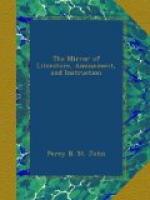“Then I’m not over-nice, as
at least you must know,
In the rank of my hosts—for
the lofty or low
Are alike to the Spirit of
Mirth;
I care not a straw with whom I have dined,
Though a family dinner’s not much
to my mind,
And a proser’s a plague
upon earth.
“But where, my dear sprite, for
this age have you been?
Have you plunged in the Danube, or danced
on the Seine?
Or have taken in Lisbon your
station?
Or have flapped over Windsor your butterfly-wings,
O’er its bevy of beauties, and courtiers,
and kings—
The wonders and wits of the
nation?”
“No; of all climes for folly, Old
England’s the clime;
Of all times for fully, the present’s
the time;
And my game is so plentiful
here,
That all months are the same, from December
to May;
I can bag in a minute enough for a day—
In a day, bag enough for a
year.
“My game-bag has nooks for ‘Notes,
Sketches, and Journeys,’
By soldiers and sailors, divines and attorneys,
Through landscapes gay, blooming,
and briary;
And so, as you seem rather pensive to-night,
To dispel your blue-devils, I’ll
briefly recite
A specimen-leaf from my diary:—
“’THE NINTH OF NOVEMBER.
“’Through smoke-clouds as
dark as a forest of rooks,
The rich contribution of blacksmiths and
cooks
From the huge human oven below,
I heard old St. Paul’s gaily pealing
away;
Thinks I to myself, ’It is Lord
Mayor’s Day,
So, I’ll go down and
look at the Show.’
“’I spread out my pinions,
and sprang on my perch—
’Twas the dragon on Bow, that odd
sign of the church,
The episcopal centre of action;
All Cheapside was crowded with black,
brown, and fair,
Like a harlequin’s jacket, or French
rocquelaire,
A legitimate Cheapside attraction.
“’Then rung through the tumult
a trumpet so shrill,
That it frightened the ladies all down
Ludgate Hill,
And the owlets in Ivy Lane;
Then came in their chariots, each face
in full blow,
The sheriffs and aldermen, solemn and
slow,
All bombazine, bag-wig and
chain.
“’Then came the old tumbril-shaped
city machine,
With a Lord Mayor so fat that he made
the coach lean;
Lord Waithman was scarcely
a brighter man;
The wits said the old groaning wagon of
state,
Which for ages had carried Lord Mayors
of such weight,
To-day would break down with
a lighter man.
“’Then proud as a prince,
at the head of the band
Rode the city field-marshal, with truncheon
in hand,
Though his epaulettes lately
are gone;
But he’s still fine enough to astonish
the cits,
And drive the economists out of their
wits,
From Lords Waithman and Wood,
to Lord John.
“’But I now left the pageant—wits,
worthies, and all—
And flew through the smoke to the roof
of Guildhall,
And perched on the grand chandelier;
The dinner was stately, the tables were
full—
There sat, multiplied by three thousand,
John Bull,
Resolved to make all disappear.




